Japan Sustainable Seafood Award will recognize individuals, companies, or collaborative projects of the year, for leading the sustainable seafood movement in Japan.
Meet the Finalists
Collaboration Award
An impactful multi-stakeholder collaborative project which took an innovative approach to drive the change in Japan.
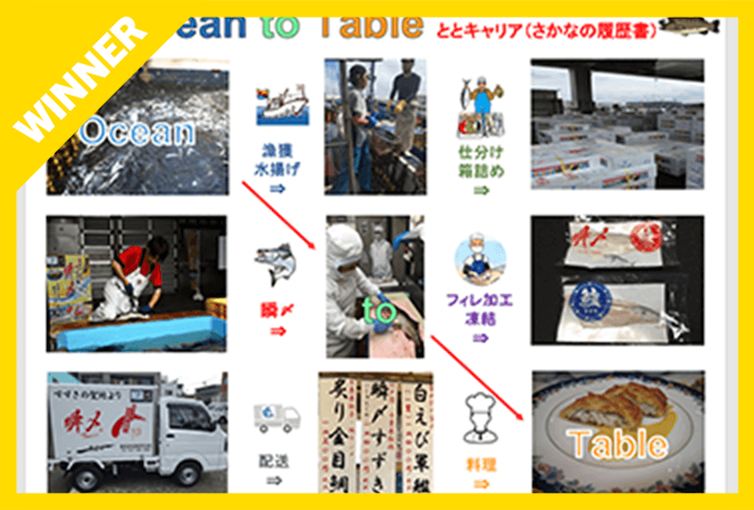
Ocean to Table: Blockchain-based Traceability Project
Kaiko Bussan Co., Ltd., IBM Japan, Ltd., IX Knowledge, Inc., Light House Co., Ltd.
Sardines and flatfish were abundant in Tokyo Bay in the 1980s during the peak of fisheries in Japan. A variety of environmental changes since then that can be attributed to human activities have not only resulted in a dramatic reduction in catch, but also a sharp spike in the reliance of fisheries on sea bass, which had a relatively large population. These changes have led to Funabashi City unexpectedly becoming the top landing site for sea bass in Japan. Currently, no management targets or catch quotas have been specified for sea bass, which is not classified as a TAC species. As a result, the fishing pressure on sea bass has been rising year after year while both the average size of individuals as well as its landing volume have been declining. Based on precedents around the world, this phenomenon can be said to be a warning sign that the resource is on the brink of depletion. In order to address this situation, there is an urgent need to equip fisheries with resource management capabilities. While fisheries that had participated in Japan’s first comprehensive FIPs, developed rules to govern their operations, and adopted measures to protect the marine environment and ecosystem have witnessed a growth in their brand values, there is unfortunately no means to convey this fact. In addition to freshness and flavor quality, it is now essential for fisheries to create new value and encourage ethical consumption as the shift from quantity to quality has become critical. Moreover, accurate product information aimed at discerning consumers is more important than ever on e-commerce websites in the current with-COVID era, especially when it comes to the consumption of seafood. This is also the case for consumers who are choosing restaurants to dine at.
In order to disseminate catch data collected by ISANA of Light House Co., Ltd. (which has already been adopted at some fishery sites) to ethical consumers, we have focused on leveraging the expertise of “Food Trust,” a blockchain service of IBM Corporation which has an overwhelming market share in this area. At the same time, IX Knowledge, Inc. has developed new system apps that handle landing classification data, shipment data, processing-related data, and delivery data. These apps create a mechanism that enables various stakeholders to simply scan a QR code at different stages in the distribution of products from the fishery site to access the relevant information anytime and anywhere it is needed. These products can be purchased at Rakuten’s “Earth Mall.” For end users familiar with restaurant information and recipes, the code attached to the menus of restaurants also makes the “distribution history” of a fish immediately available for perusal, allowing the consumer to verify if the fish has been caught in line with regulatory requirements and enjoy a peace of mind when dining. This “Ocean to Table” project is an innovative platform that seeks to promote traceability as a completely novel positive value, and is a highly socially valuable project for the management of fishery resources, transformation of consumption behavior, and the eradication of IUU fisheries.
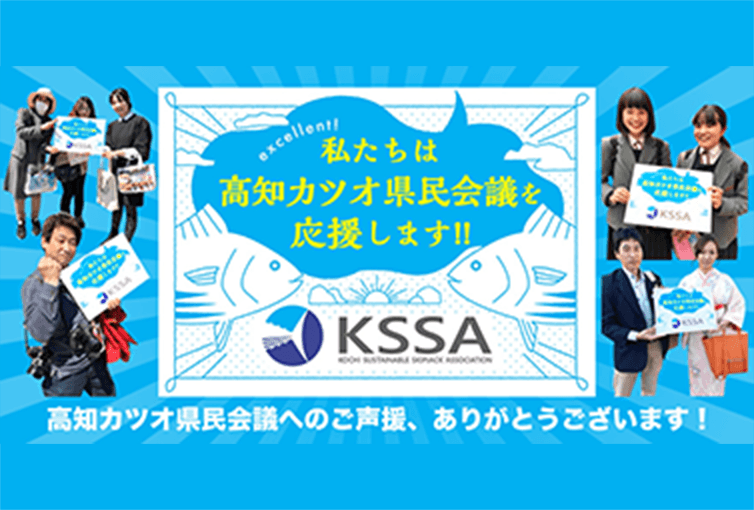
Kochi Sustainable Skipjack Association (KSSA)’s Sustainability Challenge
Kochi Sustainable Skipjack Association
In February 2017, local volunteers of Kochi prefecture who were aware of the urgent need to do something about the imminent depletion of our precious skipjack tuna (also known as bonito) launched the Kochi Sustainable Skipjack Association (“KSSA”) as a forum for discussing measures to safeguard the sustainability of skipjack tuna. Until now, KSSA has attracted around 150 members from the business community within the prefecture, including fishermen involved in skipjack tuna fishing, restaurants that mainly serve skipjack tuna dishes, retailers that handle fresh skipjack tuna, as well as various other industries with no direct relationship to skipjack tuna.
Specifically, our initiatives entail 1) the regular dissemination of information about KSSA to prefectural residents through social media such as Facebook and our homepage; 2) raising awareness of the actual sites and history of skipjack tuna fishing as well as the current situation surrounding skipjack tuna consumption, and promoting food education among children who will become leaders of our future; 3) sharing information on the current state of and challenges for skipjack tuna resource surveys, as well as discussions on and future directions for global resource management at the WCPFC; and 4) launching the “Kochi Skipjack Meister System” and organizing various events along with the certification of skilled chefs who prepare dishes using skipjack tuna with the aim of passing on our skipjack tuna culinary culture to future generations.
To date, around 30% of prefectural residents are aware of KSSA (based on the results of a street survey, n=415) with 48% of respondents indicating that they are aware that the catch volume of skipjack tuna is declining. This shows that our efforts have made an impact to some extent. In particular, we expect the “Kochi Skipjack Meister System” aimed at certifying skilled chefs who prepare dishes using skipjack tuna will have a considerable impact in addition to raising awareness of KSSA. Hitherto certified Meisters (160) have displayed the original streamers of KSSA in their restaurants, and the popularity of these Meisters has helped to raise public awareness of the initiatives of KSSA.
The Kochi Skipjack Fisheries Cooperative, a member of KSSA, has also applied for MSC as part of the activities of KSSA. Through the participation of KSSA members in a series of WCPFC activities as well as lobbying efforts, we have also established an active channel for communication with the International Pole and Line Foundation (IPNLF). As a result, KSSA was registered as the first Japanese member of IPNLF, which is an important step towards strengthening future international collaboration.
Ever since KSSA was founded, we have been working on setting suitable resource management targets for skipjack tuna as part of larger global resource management efforts. As a movement led by prefectural residents in pursuit of the sustainable management of our skipjack tuna resources, we remain committed to engaging in steady, long-term initiatives moving forward. We have faith that if our voice can grow from that of a national movement to a global movement, we will surely be able to pass on the riches of the seas in a sustainable manner to our children in the future!
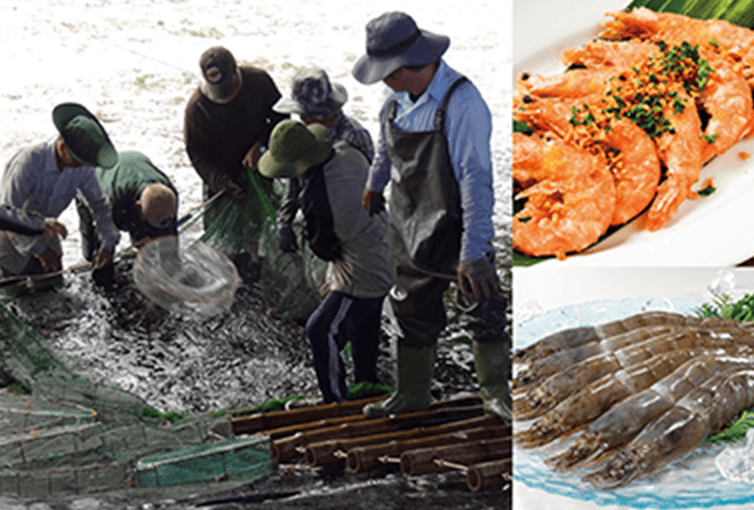
Developing New Sustainable Seafood Products and Offering at 30 Cafés and Dining
Zetton Inc., Nichirei Fresh Inc.
Zetton operates 76 restaurants in Japan and abroad under the management philosophy of “building stores is the development of individuals, building stores is the building of communities.” We are also involved in the operation of public facilities and redevelopment projects that have been delegated through an open-tender process, including the Kasai Rinkai Park and the Nakanoshima Park.
In April 2019, we launched a “Sustainable Strategy” comprising the four goals of “creating a sustainable low-carbon/carbon-free society,” “creating a society based in the sustainable utilization of resources,” “creating a society that respects human rights and the labor force,” and “promoting regional development that will facilitate the creation of a sustainable society.” We have also begun formulating and implementing policies aimed at achieving these goals.
The introduction of sustainable seafood is among our initiatives aimed at “creating a society based in the sustainable utilization of resources.”
In order to sell and offer MSC/ASC-certified sustainable seafood with the goal of environmental conservation and passing on our vibrant seas to future generations, three of our restaurants in Kasai Rinkai Park successfully obtained their “MSC/ASC CoC” certification in December 2019 with the support of our business partners. In July 2020, another 30 of our restaurants in Japan successfully obtained a “MSC/ASC CoC” group certification.
For this project, we have focused on the “soft-shell shrimp” that is used in Aloha Table’s popular signature dish “garlic soft-shell shrimps.” Soft-shell shrimp is a rare ingredient with challenging quality control, but we have established a stable supply of this ingredient after a year of planning and coordination based on the proprietary quality control requirements of Nichirei Fresh. This has made it possible for our restaurant to sell and offer its signature dish whose texture is extremely important in the form of an ASC-certified product.
We believe that we have built a successful model case for a food supply chain that allows even ingredients for which certification has been difficult to be sold and offered on sustainable seafood menus of restaurants through the determined efforts of our business partners and collaboration with food service companies like us.
By selling products and offering dishes on menus that feature sustainable seafood at 30 cafés and dining establishments around Japan, we are confident that we will reach more than 2 million customers each year and raise public awareness of sustainable seafood within Japan even further. At restaurants that cater to family dining, we also hope that this will present an opportunity for children who will become leaders of our future to learn more about ocean issues.
Finally, this project will not only contribute to an increased utilization of sustainable seafood by companies in the food service industry, but will also play an important part in supporting the livelihood of fishermen and producers in Japan and beyond, as well as protecting the abundant riches of our seas.
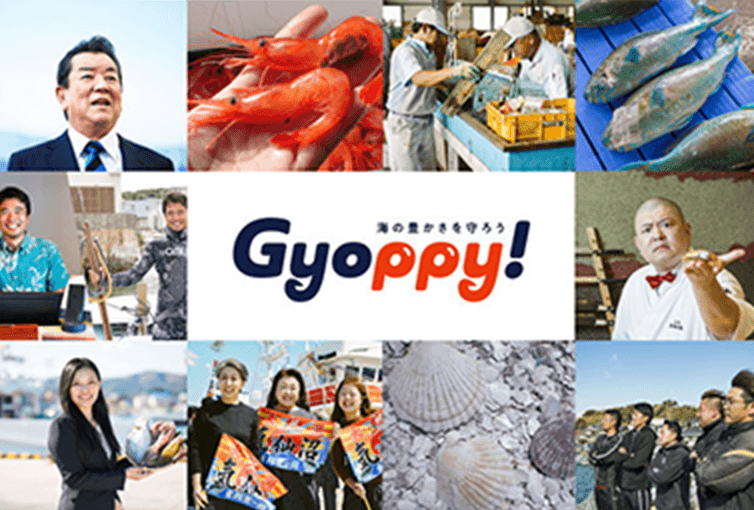
Gyoppy!
Yahoo! Japan Corporation, SR Promotion Headquarters, Services Development Office, Problem-Solving Media Team, Huuuu Inc., Editorial Department, QUISHIN Inc., Maruha Nichiro Corporation, Corporate Communication Department, Dotlife, Ltd., Editorial Department
Our seas are currently plagued with many problems including overfishing and a decline in catch volume. “Gyoppy!” is a media service operated by Yahoo! Japan Corporation since October 2018 with the goal of tackling these issues. This service aims to allow readers to cultivate an interest in the sea and learn more about current issues through reading original articles written by editorial departments as well as articles provided by content partners.
In addition, some articles and mail magazines published by Gyoppy! link readers to “Yahoo! Online Charity” where they are invited to purchase sustainable seafood, etc. This has allowed readers to offer their support in tackling these issues.
Yahoo! Japan established a base in Ishinomaki in 2012 in the aftermath of the Great East Japan Earthquake. The company has stationed employees there to work on addressing regional issues on a day to day basis, which has given rise to a variety of synergistic effects. “Gyoppy!” was launched to share the challenges encountered by the fisheries industry and the charms of the sea that can be experienced locally with consumers throughout Japan, and to compel stronger action to tackle existing issues.
Since its launch, Gyoppy! has regularly addressed the issue of the sustainability of marine resources. It has published many articles on MSC/ASC certification, the individuals involved in resource management, and the status of different species of fish (https://yahoo.jp/qF1qASd).
Still, not many people are interested in these issues. In view of this, Gyoppy! has been making every effort to relate these issues with concerns that people typically have such as work and interpersonal relationships as a means of raising public awareness. For instance, the resource management of shrimps at Sado was linked to the issue of workstyle reforms and shared with readers under the heading of “Stopping overfishing has led to higher profits and more off-days” (https://gyoppy.yahoo.co.jp/originals/16.html), which reverberated with readers on social media.
The launch of Gyoppy! was possible only with the help of many parties. Its original content is planned and edited by a joint editorial team that includes members from QUISHIN Inc. and Huuuu Inc. Also, many companies and organizations that run their own media platforms that address issues related to the sea, people whose lives are inextricable from the sea, and other phenomena and happenings related to the sea have become content partners of Gyoppy! with whom they share their articles.
The articles made available on Gyoppy! through these avenues are shared with readers by drawing on the communication capabilities of Yahoo! Japan, which has allowed more people to become aware of issues related to the sea.
Leadership Award
A pioneer project which contributed to expanding the sustainable seafood movement in Japan by setting the milestones for the industry.
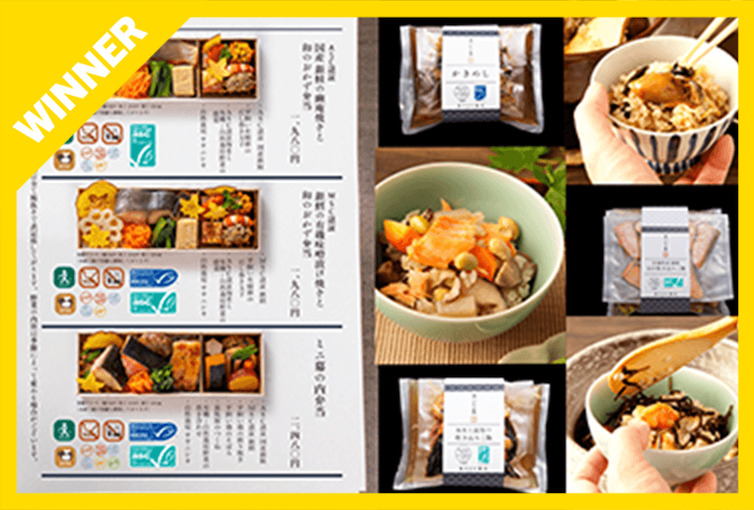
Kijima: “Passing on Delicious Japanese Cuisine and Our Vibrant Seas to Future Generations”
Kijima Co., Ltd.
Under the slogan of “Passing on delicious Japanese cuisine and our vibrant seas to future generations,” Kijima has been engaged in various efforts aimed at addressing the problems surrounding our seas in a multifaceted manner so as to ensure that the seas of Japan will be preserved in a sustainable manner.
“What can Kijima do to pass on our vibrant seas to future generations?”
“What can Kijima do for our seas in terms of our social responsibility as a company that is operating restaurants serving seafood?”
Kijima takes these questions seriously and is currently involved in the following initiatives.
● The first restaurant serving Japanese cuisine offering MSC/ASC-certified seafood
・Ratio of MSC-certified products among wild fish: 8.3% (3 MSC-certified items out of 36)
・ Ratio of ASC- certified products among farmed fish: 60% (3 ASC-certified items out of 5)
(All figures are based on our monthly menu items as of September 2020)
● Promoting the use of organic/naturally cultivated agricultural products
The contamination of soil, rivers, and groundwater with pesticides and fertilizers ultimately leads to pollution of the sea.We have launched the “Kijima Organic Challenge” this term to visualize the rate of use of organic/naturally cultivated agricultural products in addition to that of sustainable seafood described above
・Ratio of naturally cultivated rice: 100%
・Ratio of organic/naturally cultivated products among fresh agricultural products: 56.6%
(All figures are based on our monthly menu items as of September 2020)
● Eliminating synthetic detergents
This term, we have successfully eliminated the use of petroleum-derived synthetic surfactants, which are a major source of marine pollution.
● Promoting the use of FSC-certified forest resources
Kijima uses FSC-certified wood materials for our chopsticks, straws, and restaurant interior décor. Our use of FSC-certified forest resources serves to demonstrate our understanding of the intimate connection between the forest and the sea, share the importance of “protecting forests in order to safeguard our seas” with all employees of our company, and convey this message to our customers.
The progress we have made this term includes successfully obtaining the first “FSC project certification” among Japanese restaurants for our restaurant in Minatomirai, and replacing the paper straws used in all our restaurants with FSC-certified straws produced in Yamanashi prefecture.
● Adopting environment-conscious printed matter
We are currently in the process of replacing the printed matter that our customers touch and see at Kijima with materials produced using non-petroleum-based solvent inks friendly to humans and the environment, FSC-certified paper, and renewable energy. Around 990,000 pamphlets and other in-store printed matter produced annually has been replaced with environment-conscious printed matter this term.
● Eliminating the use of plastic
This term, we have replaced all packaging materials for bento boxes used in our food delivery and catering operations with containers made from paper and wood without the use of any plastic.
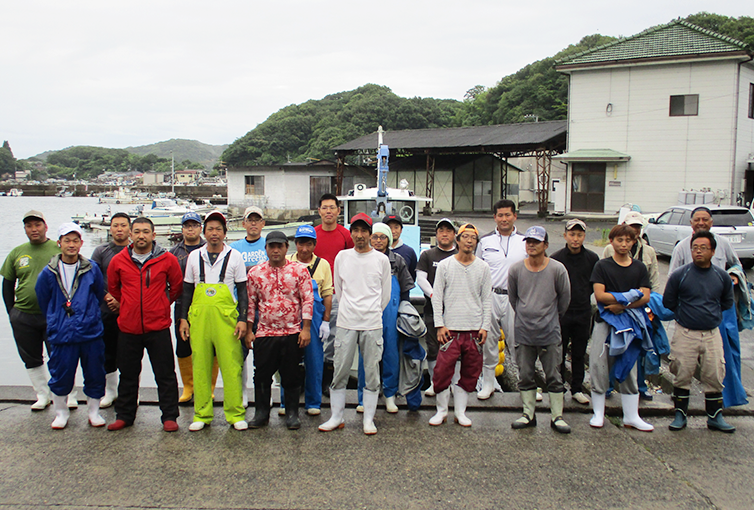
Delivering Sustainable Kushikake Oyster to the World
Oku Fisheries MSC Team, Oku Fisheries Cooperative, Maruto Suisan Co., Ltd., Aeon Retail Co., Ltd.
In December 2019, the oyster fisheries in Oku of Setuochi, which boasts the largest oyster production volume in Okayama prefecture, successfully obtained the international MSC certification as proof of the production area’s high sustainability standards.
・We have established what can be considered the best practice under which even small-scale fisheries in Japan can successfully obtain international certifications given adequate preparation.
・To address the concerns of fisheries organizations and producers about their future, we have introduced the mindset of striving for long-term growth from the perspective of ESG (environmental, social, governance) through the acquisition and maintenance of international MSC certifications.
・We have created a model in which compliance with MSC standards, such as daily production activities centered on ESG, contributes to the achievement of SDGs and fulfills the needs of stakeholders.
Through the acquisition of international certifications that are globally recognized, oysters produced by “Japanese brands” are now highly regarded ahead of those from countries such as China and Korea which boast higher production volumes than Japan in terms of “oysters” consumed around the world. We have also expanded into overseas markets.
・We have increased the supply of eco-labeled seafood which has seen a high retail demand in Japan to stores such as Aeon, and expanded our domestic market.
・We have become aware that we have reached a level that satisfies the procurement code for the Tokyo Olympic and Paralympic Games which takes sustainability standards into consideration.
13 relatively newer fisheries from the Oku Fisheries Cooperative (Setouchi, Okayama prefecture: 64 oyster fisheries, annual landing volume of 1500 tons) were involved in the certification process over the course of around two years from 2017. 13 fisheries participated in the initiative in 2019, and 30 fisheries participated in 2020, making it possible for around 800 tons of MSC-certified oysters to be produced annually.
The major retailer Aeon presented a solution that addressed the concerns of producers about their future, while the manufacturer Maruto Suisan assisted with the certification process. Coupled with the 13 participating producers and the Fisheries Cooperative, this initiative has successfully drawn on the close collaboration between primary, secondary, and tertiary industries to satisfy the latent demand of consumers and create a “win-win-win” scenario for all three companies involved.
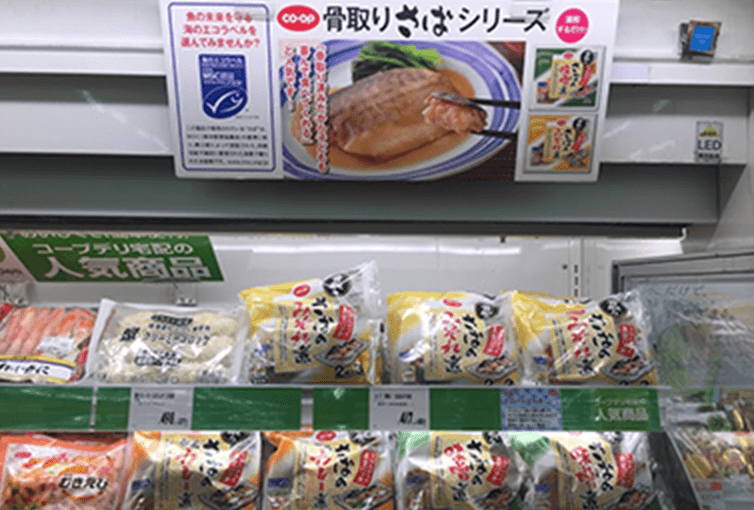
Japanese Consumers' Co-operative Union’s Initiative to Procure and Promote Sustainable Seafood
Japanese Consumers' Co-operative Union
The Japanese Consumers' Co-operative Union (“JCCU”) is a national association of regional cooperatives and cooperative unions for individual prefectures and industries. With member cooperatives reporting sales that amount to 3.5 trillion yen and 29.6 million union members in total, JCCU is the largest consumer organization in Japan.
JCCU revised its “CO-OP Product Policy” in 2016 to give higher priority to “products that take the environment, people, and society into consideration” and the “promotion of ethical consumption” (CO-OP products refer to products under the private brand of JCCU).
In response to this policy, the “Seafood Procurement Guidelines for JCCU CO-OP products” were formulated as a procurement policy for the fisheries sector in July 2017. The “sustainable utilization of fishery resources and responsible procurement” have also been advanced as means of catering to ethical consumption in the fisheries sector, as we collaborated on initiatives with member cooperatives and other stakeholders such as our business partners and production areas.
As part of our initiatives, we have emphasized effective communication on issues surrounding the eco-labels for seafood certifications such as MSC as well as fisheries resources, which we have discussed in the “Ethics of Cooperatives” book that has been published every year since 2018. We have also encouraged the incorporation of certified seafood as ingredients that our union members regularly use. The acquisition of MSC certifications for Atlantic mackerel produced in Norway in 2016 as well as for the “boneless mackerel and sleet stew” and “boneless mackerel miso stew,” the two most popular products in the fisheries sector, in June 2017 served as an effective promotion of MSC-certified products at many cooperatives. Since then, we have been expanding the number of target fish species and making MSC-certified products available outside the fisheries sector. We are also working on the “Indonesia Sulawesi Shrimp Aquaculture Improvement Project (AIP)” as well as the “Hiroshima Prefecture Oyster Fishery Improvement Project (FIP).” Consumer usage and awareness of MSC-labelled products are regularly assessed through the use of our JCCU monitoring surveys. In November 2016, 9.3% of respondents indicated that they have purchased such products before while 6.6% indicated that they have seen such products but have yet to purchase them. These numbers rose to 19.3% and 10.4% respectively in December 2018, reflecting a wider reach of certified products and the effectiveness of our initiatives. Although we have previously committed to improving the ratio of certified products in our total CO-OP product supply for the fisheries sector to “20% by 2020,” the supply figures for certified products for 2019 have risen by over five times from 2016, with MSC, ASC, and MEL-certified products accounting for 19.0%, 0.5%, and 0.9% of the total supply for the fisheries sector respectively.
Finally, we have revised our “Seafood Procurement Guidelines” in January 2020 to reflect our new post-2020 supply ratio targets of “over 20% as early as 2025, and over 30% by 2030” in view of the effects of the suspension of MSC certification for Atlantic mackerel.
Co-op Action Plan for SDGs: https://jccu.coop/eng/feature/coop_action_plan/
Ethical by Co-oP: https://jccu.coop/eng/feature/ethical/
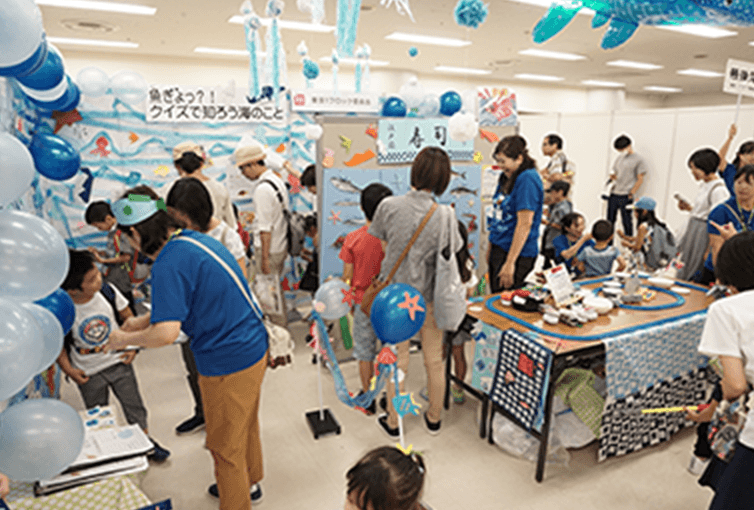
An Ethical Initiative for the Sea Through Food Sampling, Learning, and Interactions Project
CO-OP Mirai, Organizational Management Department, CO-OP Mirai, Chiba/Saitama/Tokyo Headquarters, Co-op Deli Consumers’ Cooperative Union, Home Delivery & Fresh Products Department, Co-op Deli Consumers’ Cooperative Union, CSR Promotion Department
“Let’s try this together! An ethical initiative for the sea” is an initiative that allows participants to sample sustainable seafood at study meetings and events, and chat with each other while learning more about the current state of marine resources and what they can do as consumers in an enjoyable manner. These events were held at around 300 different venues in Chiba, Saitama, and Tokyo (areas under the jurisdiction of CO-OP Mirai) in 2019, attracting around 3,800 participants and successfully extending the reach of our initiative.
<The Purpose of the Initiative>
With the launch of our 2025 corporate vision of “bringing smiles to the dining table, enriching local areas, and becoming a co-op that everyone can rely on,” CO-OP Mirai has been working alongside over 3.5 million of our members* to achieve the SDGs and actively encourage ethical consumption.
For the fisheries sector, we have continued with current efforts to protect fishery resources in view of the deterioration of the condition of these resources and the urgent situation involving the declining consumption of fish, so as to ensure that delicious fish-based dishes that epitomize Japanese cuisine can continue to be served. We formulated a set of “Sustainable Procurement Guidelines” that outlined our views on seafood in 2017, as we continue to actively embrace sustainable seafood such as MSC/ASC-certified products and products procured directly from fisheries.
However, in order to expand the range of sustainable products we can carry and ensure a stable supply of these products, it is imperative for union members and consumers themselves to learn more about the current state of our marine resources and their challenges, and understand how their choice of these products will contribute to safeguarding the richness of our seas. We launched the “Let’s try this together! An ethical initiative for the sea” in 2019 for these reasons.
*Consumers who are members of the CO-OP
<Details and Results of the Initiative>
“Let’s try this together! An ethical initiative for the sea” has facilitated learning through the creation of learning materials and tools that explain the current state of our marine resources and sustainable products in an easy-to-understand manner. An understanding of these products as well as various culinary ideas have also been fostered through cooking sessions and sampling sessions involving selected products where participants could experience their delicious flavors. We also set up a booth at the general consumer event “CO-OP Mirai Festa,” where many of the 57,000 attendees across the two event venues were able to learn about our efforts to safeguard the richness of our seas while they enjoyed games and quizzes.
Some feedback gathered from participants at this event included, “I learned about the current state of our marine resources before sampling some products, which has allowed me to understand these products better,” and “I now understand the significance of MSC/ASC certifications and I will be looking out for them when I am shopping.” This initiative has given many union members and consumers the opportunity to discover the appeal of sustainable seafood, experience its delicious flavors and share new culinary ideas, and understand that purchasing these products will contribute to safeguarding the richness of our seas.
Special Award
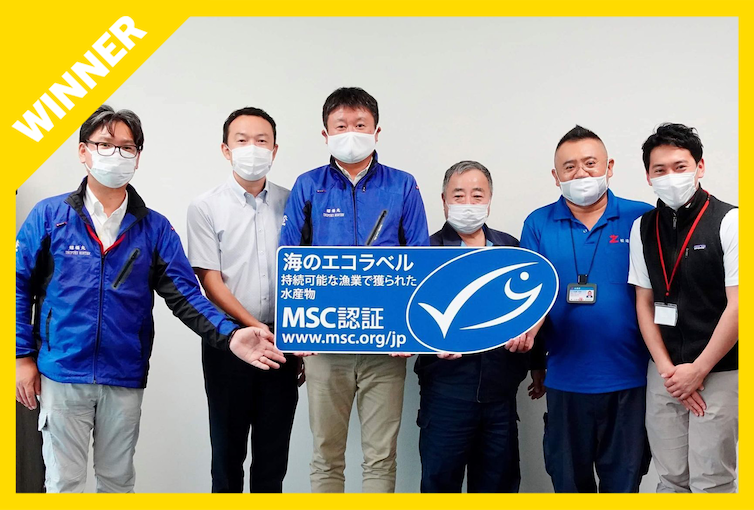
Usufukuhonten Co., Ltd.
In August of this year, Usufukuhonten became the first company in the world to receive MSC certification for the Atlantic bluefin tuna fishery. Bluefin tuna has long been a favorite ingredient for sushi, especially among Japanese, but the decline of its stock has led to international controversy over the quota for the fishery.
However, scientific evidence has shown that the abundance of bluefin tuna is recovering, and Usfukuhonten was able to obtain certification in August of this year in recognition of its longstanding efforts to ensure traceability while protecting the quota for the fishery.
In addition to making the fishing industry sustainable, the company also built a new fishing boat (the Daiichi Shofuku Maru) to make it easier for the crew to work and take care of their stress, as they have to spend long periods of time at sea once they set out to fishing. This effort was recognized widely and won this year's Good Design Award.